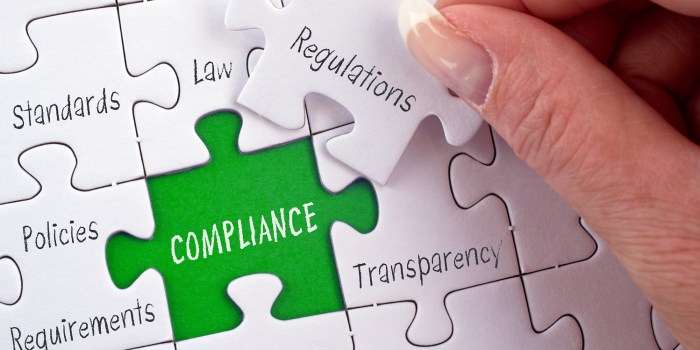Online Business Compliance sets the stage for safeguarding businesses in the digital realm, navigating through the complex web of regulations to ensure seamless operations. From understanding the importance of compliance to implementing measures and training employees, this topic delves deep into the critical aspects of staying on the right side of the law.
Importance of Online Business Compliance
Online business compliance is crucial for businesses to ensure they are operating within the legal frameworks and regulations set by authorities. Failure to comply with these rules can lead to severe consequences that can impact the reputation, finances, and overall operations of a business.
Potential Risks of Non-Compliance
Non-compliance in the online business environment can result in hefty fines, legal actions, and even the shutdown of a business. Additionally, businesses may face reputational damage, loss of customer trust, and decreased market competitiveness due to non-compliance with regulations.
- Businesses failing to comply with data protection laws, such as GDPR, can face fines of up to millions of dollars.
- Failure to adhere to consumer protection regulations can lead to lawsuits and compensation claims from customers.
- Non-compliance with tax laws can result in penalties, audits, and legal actions from tax authorities.
Key Regulations for Online Business Compliance
In order to operate legally and ethically, online businesses must adhere to various regulations that govern data protection, security, and consumer rights. Failure to comply with these regulations can result in hefty fines and damage to the business’s reputation.
General Data Protection Regulation (GDPR)
The GDPR is a regulation implemented by the European Union to protect the personal data of individuals. Online businesses that collect or process personal data of EU citizens must comply with GDPR requirements, such as obtaining consent for data collection, ensuring data security, and providing individuals with the right to access and delete their data.
Payment Card Industry Data Security Standard (PCI DSS)
PCI DSS is a set of security standards designed to ensure that all companies that accept, process, store, or transmit credit card information maintain a secure environment. Online businesses that handle credit card payments must comply with PCI DSS requirements, including securing payment card data, implementing access controls, and regularly monitoring and testing security systems.
California Consumer Privacy Act (CCPA)
The CCPA is a state-level privacy law in California that grants consumers more control over the personal information that businesses collect about them. Online businesses that collect personal information from California residents must comply with CCPA regulations, such as providing consumers with the right to access, delete, and opt-out of the sale of their personal information.
Children’s Online Privacy Protection Act (COPPA)
COPPA is a federal law in the United States that imposes certain requirements on websites and online services that collect personal information from children under the age of 13. Online businesses that target children as their primary audience must comply with COPPA regulations, such as obtaining parental consent before collecting any personal information from children.
Health Insurance Portability and Accountability Act (HIPAA)
HIPAA is a federal law that sets standards for the protection of sensitive patient health information. Online businesses that handle protected health information (PHI) must comply with HIPAA regulations, including implementing safeguards to protect PHI, restricting access to PHI, and ensuring the integrity and confidentiality of PHI.
Implementing Compliance Measures: Online Business Compliance

To establish compliance measures for an online business, follow these steps:
Step 1: Understand Regulations
- Research and understand the relevant regulations and laws that apply to your online business.
- Identify the specific compliance requirements that you need to meet.
- Stay updated on any changes or updates to regulations that may impact your business.
Step 2: Develop Policies and Procedures
- Create comprehensive policies and procedures that Artikel how your business will comply with regulations.
- Ensure that all employees are trained on these policies and procedures.
- Regularly review and update your policies to reflect any changes in regulations or business practices.
Step 3: Implement Monitoring and Auditing
- Set up monitoring systems to track compliance with regulations on an ongoing basis.
- Conduct regular audits to assess the effectiveness of your compliance measures.
- Address any non-compliance issues promptly and make necessary improvements.
Best Practices for Maintaining Compliance
- Assign a compliance officer or team to oversee compliance efforts.
- Document all compliance activities and decisions for record-keeping purposes.
- Implement regular training sessions to keep employees informed about compliance requirements.
Role of Technology and Automation
Utilize technology and automation tools to streamline compliance processes:
- Use compliance management software to track and manage regulatory requirements.
- Implement automated alerts and reminders to ensure timely compliance tasks.
- Leverage data analytics to identify potential compliance risks and areas for improvement.
Training and Education on Compliance

Training employees on compliance regulations is crucial for ensuring that an organization operates within legal boundaries and avoids costly penalties. By providing education on compliance, businesses can empower their staff to make informed decisions and uphold ethical standards in their daily operations.
Key Topics in Compliance Training Programs
- The importance of compliance regulations and consequences of non-compliance
- Specific laws and regulations relevant to the industry
- Proper handling of sensitive data and information security protocols
- Reporting procedures for violations or suspicious activities
- Training on anti-discrimination and harassment policies
Fostering a Culture of Compliance through Continuous Education
Continuous education plays a vital role in fostering a culture of compliance within an organization. By offering regular training and updates on regulatory changes, employees are more likely to stay informed and compliant. This ongoing education also helps in reinforcing the importance of ethical behavior and accountability at all levels of the organization.
Auditing and Monitoring Compliance
Regular compliance audits are crucial for ensuring that an online business is following all relevant regulations and guidelines. These audits involve a systematic review of the business’s operations, processes, and documentation to identify any non-compliance issues.
Conducting Regular Compliance Audits, Online Business Compliance
- Establish a schedule for conducting audits, whether monthly, quarterly, or annually, to ensure consistency.
- Assign specific team members or hire external auditors to perform the audits objectively and thoroughly.
- Review all aspects of the business, including data privacy, security measures, financial transactions, and marketing practices.
- Create detailed audit reports with findings, recommendations, and action plans to address any compliance gaps.
Significance of Monitoring Compliance Metrics and Key Performance Indicators
Monitoring compliance metrics and key performance indicators allows an online business to track its adherence to regulations and assess its overall compliance health. This helps in identifying areas of improvement and ensuring continuous compliance.
- Regular monitoring ensures that the business stays aligned with changing regulations and industry standards.
- Tracking key performance indicators helps in measuring the effectiveness of compliance measures and identifying areas for enhancement.
- Monitoring compliance metrics provides early detection of potential issues, allowing for timely corrective actions to be taken.
Tools and Software for Tracking Compliance
- Compliance management software like Compliance 360, LogicManager, or ZenGRC can streamline audit processes and centralize compliance data.
- Monitoring tools such as Microsoft Power BI, Tableau, or Google Analytics can be used to track compliance metrics and generate reports.
- Data analytics platforms like Splunk or IBM QRadar can help in identifying compliance anomalies and potential risks in real-time.
